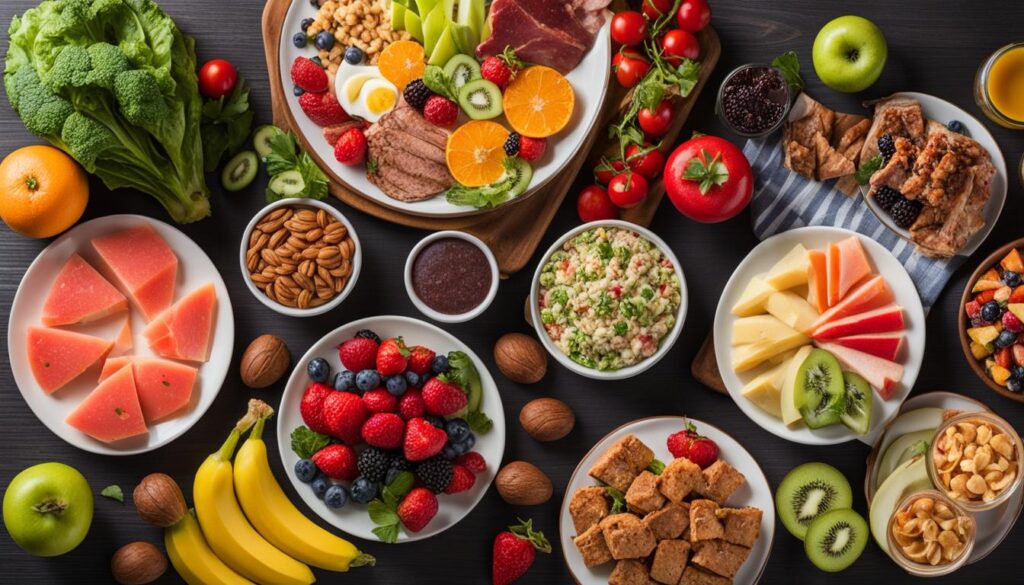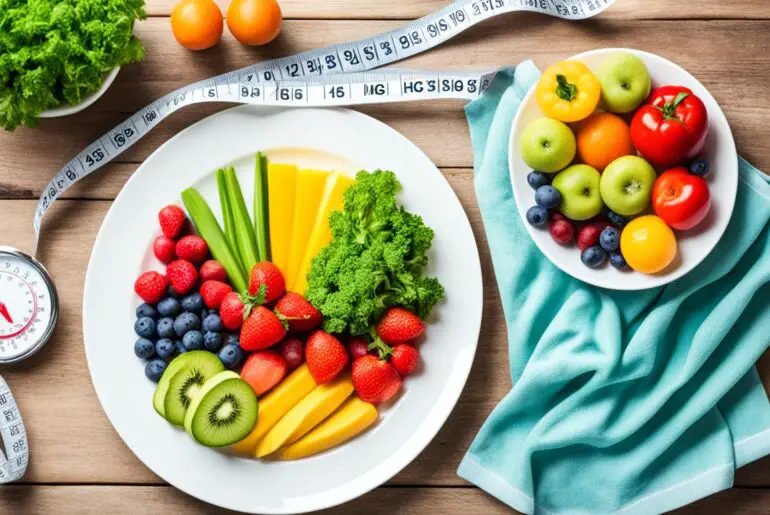Are you struggling to curb your hunger while following the HCG Diet? Do cravings and appetite disrupt your progress? Don’t worry, I’ve got you covered. In this article, I will share effective strategies and tips to help you overcome hunger pains on the HCG Diet and stay on track towards your weight loss goals.
- Stay hydrated by drinking plenty of water to help manage hunger.
- Consider using coffee or green tea as appetite suppressants.
- Space out your meals and never skip protein for sustained satiety.
- Incorporate “free” vegetables into your diet to add bulk and fiber.
- Properly load up on high-fat foods during loading days to minimize hunger during the low-calorie phase.
Tips to Manage Hunger on the HCG Diet
When following the HCG Diet, managing hunger can be a challenge. However, with a few useful tips, you can keep hunger under control and stay on track with your weight loss journey.
Here are some effective strategies to help manage hunger while on the HCG Diet:
- Stay Hydrated: Drinking an adequate amount of water is crucial for hunger management. Aim to drink 2-4 liters of water daily to stay hydrated and minimize cravings.
- Utilize Appetite Suppressants: Coffee and green tea can act as natural appetite suppressants. Incorporate these beverages into your daily routine to help curb hunger.
- Space Out Meals: Instead of eating large meals, consider breaking them down into smaller, more frequent meals throughout the day. This can help prevent excessive hunger and keep your metabolism active.
- Never Skip Protein: Protein plays a vital role in satiety and hunger control. Make sure to include lean protein sources with every meal, such as chicken, fish, or tofu.
- Incorporate “Free” Vegetables: “Free” vegetables, such as celery, cucumber, radishes, lettuce, and cabbage, can be consumed in unlimited quantities on the HCG Diet. These low-calorie and high-fiber options can help satisfy hunger and keep you feeling full.
To summarize, managing hunger on the HCG Diet involves staying hydrated, utilizing appetite suppressants, spacing out meals, prioritizing protein intake, and incorporating “free” vegetables into your diet. By following these tips, you can effectively control hunger cravings and stay on track towards achieving your weight loss goals.
Understanding Hunger on the HCG Diet
When following the HCG Diet, it is important to understand the nature of hunger and how it can be managed throughout the program. Hunger is a normal and expected experience, especially in the early stages as the body adjusts to the calorie restriction. However, the good news is that hunger on the HCG Diet typically diminishes over time as the body starts utilizing stored fat for energy.
The HCG hormone, when administered as part of the diet protocol, helps the body tap into its fat stores. This is significant because, as the body breaks down stored fat, it naturally reduces hunger cravings. By encouraging the body to use its fat reserves for energy, the HCG Diet helps suppress hunger and promotes more effective weight loss.
It is important to note that while hunger on the HCG Diet is common, it can be managed effectively with the right strategies and mindset. Staying committed to the diet plan and implementing hunger management techniques can greatly improve the overall experience and success of the program.
Managing Hunger on the HCG Diet
To effectively manage hunger on the HCG Diet, it is essential to adopt certain strategies and practices. These can help you navigate through moments of hunger cravings and maintain your focus on achieving your weight loss goals. Some key techniques include:
- Staying hydrated by drinking plenty of water throughout the day.
- Incorporating appetite suppressants such as coffee or green tea.
- Appropriately spacing out meals to avoid prolonged periods of hunger.
- Ensuring that protein is included in every meal to promote satiety.
- Incorporating “free” vegetables that are allowed on the diet plan to add bulk and fiber to your meals.
By implementing these strategies, individuals can effectively manage hunger on the HCG Diet and stay on track towards achieving their weight loss goals.
“Understanding the nature of hunger on the HCG Diet is crucial for success. By realizing that hunger is a normal part of the initial adjustment period and that the HCG hormone helps reduce cravings, individuals can approach the diet with confidence and determination.”
Furthermore, it is important to stay motivated and remind yourself that the initial hunger experienced during the early stages of the diet is temporary. As the body adapts to the calorie restriction and starts utilizing stored fat for energy, hunger typically diminishes, resulting in a more comfortable and sustainable weight loss journey.
| Benefits of Understanding Hunger on the HCG Diet | Key Takeaways |
|---|---|
| 1. Helps set realistic expectations for hunger cravings. | – Hunger on the HCG Diet is common but can be managed effectively. – The HCG hormone aids in reducing hunger by promoting fat utilization. |
| 2. Enables individuals to develop effective hunger management strategies. | – Staying hydrated, incorporating appetite suppressants, spacing out meals, including protein, and adding “free” vegetables can all help manage hunger. – Understanding the nature of hunger helps individuals stay motivated and committed to the diet plan. |
| 3. Offers reassurance during the adjustment period. | – Recognizing that hunger is a normal part of the initial stage helps individuals maintain a positive mindset. – Hunger typically subsides as the body adapts to the calorie restriction and begins utilizing stored fat for energy. |
The Role of Loading Days in Hunger Management

During the HCG Diet, loading days play a crucial role in hunger management and appetite control. These initial days are designed to provide the body with a calorie reserve that helps sustain hunger during the low-calorie phase. By consuming high-fat foods in abundance, individuals can jump-start their diet and minimize hunger in the following days.
Over-consuming healthy fats such as salmon, avocado, and nuts during the loading days can have a significant impact on hunger management. These foods are not only delicious but also keep you feeling satiated for longer periods. Incorporating them into your diet can help control your appetite and prevent excessive hunger throughout the diet plan.
To visually illustrate the importance of loading days in hunger management on the HCG Diet, refer to the table below:
| Food | Calories per 100g | Fat per 100g |
|---|---|---|
| Salmon | 206 | 13.4g |
| Avocado | 160 | 14.7g |
| Nuts (mixed) | 607 | 52g |
As seen in the table above, these high-fat foods provide a significant calorie boost while also supplying essential fats. Incorporating them into your diet during the loading days can contribute to hunger management and help you stay on track with the HCG Diet.
Preparing Meals Ahead of Time for Hunger Prevention
Meal preparation is a valuable tool in preventing hunger and cravings on the HCG Diet. By taking the time to plan and prepare meals in advance, you can set yourself up for success and avoid impulsive food choices when hunger strikes. This proactive approach to meal planning not only ensures that you have nutritious options readily available, but it also helps you stay on track with your HCG diet plan.
When preparing meals ahead of time, consider incorporating a variety of lean proteins, “free” vegetables, and portioned servings of fruits. This balanced approach provides the necessary nutrients while keeping you satisfied and preventing hunger throughout the day. Additionally, be mindful of your calorie count and ensure that you are within the recommended range for the HCG diet plan.
One effective strategy for meal preparation is to set aside a specific day or time each week to dedicate to planning and cooking. This allows you to streamline the process and ensures that you have a variety of meals available throughout the week. Consider using containers or meal prep bags to portion and store your meals, making them easily accessible when hunger strikes.
When preparing your meals, aim for a balance of macronutrients and flavors. Incorporate lean proteins such as grilled chicken, turkey, or fish, and pair them with a selection of colorful vegetables. By including a variety of spices and herbs, you can add flavor to your meals without relying on high-calorie sauces or dressings.
The Benefits of Preparing Meals Ahead of Time:
- Prevents impulsive food choices during times of hunger
- Ensures a balanced and nutritious diet
- Saves time and reduces stress during the week
- Helps with portion control and calorie tracking
- Encourages mindful eating habits
By dedicating some time to meal preparation each week, you are taking a proactive step towards hunger prevention on the HCG Diet. This simple yet effective strategy can make a significant difference in your ability to stick to the diet plan and achieve your weight loss goals.
| Meal Preparation Tips | Benefits |
|---|---|
| Plan your meals for the week | – Allows for better portion control |
| Batch cook proteins | – Saves time in the kitchen |
| Chop and wash vegetables in advance | – Makes meal assembly quicker |
| Portion meals into containers | – Helps with calorie tracking |
| Label and store meals properly | – Avoids food spoilage |
Proper “Cheat” Foods for Hunger Relief

Occasionally, when following the HCG Diet, incorporating certain cheat foods can provide temporary satiety and offer hunger relief without negatively impacting weight loss. These cheat foods can help manage cravings and prevent excessive hunger, allowing individuals to stay on track with their diet plan.
Below are some examples of “cheat” foods that can be consumed in moderation on the HCG Diet:
| Food | Description |
|---|---|
| Green Vegetables | Include leafy greens like spinach, kale, and lettuce that are low in calories and high in nutrients. |
| Chicken Bouillon | Enjoy a warm cup of chicken bouillon, which can help soothe hunger and provide a savory taste without added calories. |
| High-Quality Beef Jerky | Opt for lean and high-quality beef jerky as a portable and protein-packed snack that can keep hunger at bay. |
Remember, the key is to consume these cheat foods in moderation and not to let them derail you from your HCG Diet plan. These options can help provide hunger relief without compromising your weight loss efforts.
By incorporating these cheat foods strategically, you can effectively manage hunger while staying focused on achieving your weight loss goals. It is essential to have a balanced approach and continue following the HCG Diet guidelines to ensure the best results.
Understanding Hunger and Weight Loss Patterns
When following the HCG Diet, it’s important to understand the connection between hunger and weight loss. Hunger patterns on this diet tend to follow a specific trajectory, aligning with the body’s natural response to calorie restriction. By understanding these patterns, individuals can better manage their hunger cravings and stay motivated to achieve their weight loss goals.
In the initial stages of the HCG Diet, it’s common to experience an increase in hunger. This is because the body is adjusting to the reduced calorie intake. However, as the HCG hormone starts tapping into stored fat for energy, hunger gradually subsides.
The first week is typically when hunger peaks the most. It is during this time that the body is transitioning from relying on carbohydrates for energy to using stored fat. This adjustment period can be challenging, but it’s important to stay committed as the initial rapid weight loss experienced during this phase can serve as motivation to overcome hunger and continue with the program.
As the HCG Diet progresses, hunger levels tend to decrease. This occurs as the body becomes more efficient at utilizing stored fat for energy. The hormone helps suppress appetite and reduces the intensity of hunger cravings. Individuals may find that they no longer feel the need to eat as frequently or consume as much food as they did in the beginning.
Staying mindful of hunger patterns can help individuals navigate this weight loss journey. Recognizing that hunger will likely decrease over time can provide encouragement and support in staying on track with the HCG Diet.
| Hunger Patterns on the HCG Diet | Weight Loss Progress |
|---|---|
| Hunger peaks during the first week | Rapid weight loss during the initial stages |
| Hunger gradually subsides | Continued weight loss as fat stores are utilized |
| Appetite suppresses as the body adjusts | Steady weight loss as the diet progresses |
By understanding hunger and weight loss patterns on the HCG Diet, individuals can better manage their expectations, stay motivated, and achieve successful results. The initial challenges of increased hunger can be overcome with patience and commitment, leading to long-term success and improved well-being.
Importance of Ketosis in Hunger Suppression

Achieving and maintaining ketosis is crucial for hunger suppression on the HCG Diet. Ketosis occurs when the body starts breaking down stored fat for energy instead of relying on carbohydrates. By keeping carbohydrate intake below 30 grams per day, the body remains in ketosis, which helps suppress hunger and facilitates weight loss.
In ketosis, the body produces ketones, which are molecules that serve as an alternative fuel source. When carbohydrates are limited, the body turns to fat stores as its primary source of energy. This metabolic state not only promotes fat burning but also contributes to reduced hunger cravings.
When the body is in ketosis, blood sugar levels remain stable, preventing drastic spikes and crashes that can trigger hunger. By relying on fat for fuel, the body maintains a steady supply of energy throughout the day, reducing the frequency and intensity of hunger pangs.
Research has shown that the HCG Diet, combined with a low-carbohydrate approach, can effectively induce and maintain ketosis. The combination of the HCG hormone and a low-calorie diet triggers the body to tap into its fat stores, leading to rapid weight loss and hunger suppression.
The Benefits of Ketosis for Hunger Suppression
When following the HCG Diet and achieving ketosis, individuals may experience several benefits in terms of hunger management:
- Reduced cravings: Ketosis helps reduce cravings for high-carbohydrate and sugary foods, making it easier to adhere to the HCG Diet plan.
- Increased satiety: The consumption of healthy fats and protein on the HCG Diet promotes feelings of fullness and satisfaction, reducing the desire to eat more.
- Stable blood sugar levels: Ketosis helps stabilize blood sugar levels, minimizing hunger caused by rapid fluctuations in glucose.
- Improved energy levels: By utilizing stored fat for energy, ketosis provides a consistent and sustainable source of fuel, leading to increased energy levels and reduced fatigue.
To optimize hunger suppression and maximize the benefits of ketosis on the HCG Diet, it is essential to closely monitor carbohydrate intake and adhere to the recommended guidelines. This includes choosing low-carbohydrate, high-fiber foods and eliminating or minimizing processed and sugary foods.
| Recommended Low-Carbohydrate Foods for Ketosis | Carbohydrate Content per Serving |
|---|---|
| Leafy green vegetables (spinach, kale, lettuce) | 1-2 grams |
| Cruciferous vegetables (broccoli, cauliflower, Brussels sprouts) | 2-3 grams |
| Avocado | 2 grams |
| Berries (strawberries, blueberries, raspberries) | 5-10 grams |
| Meat, poultry, and fish | 0 grams |
| Eggs | 0 grams |
| Nuts and seeds | 2-5 grams |
By incorporating these low-carbohydrate foods into your HCG Diet plan, you can continue to enjoy a variety of nutrient-dense options while staying in ketosis and effectively suppressing hunger.
Tips for Overcoming Emotional Hunger

Emotional hunger can be a significant challenge while following the HCG Diet. Managing cravings and addressing the underlying emotional issues is essential for maintaining progress and preventing derailing from the diet plan.
- Distract Yourself: When you feel emotional hunger kicking in, distract yourself with activities that can take your mind off food. Engage in hobbies, exercise, read a book, or spend time with loved ones to divert your attention.
- Find Alternative Activities: Instead of turning to food for comfort, explore alternative activities that can help satisfy your emotional needs. Try journaling, meditating, practicing deep breathing exercises, or listening to calming music as a way to cope with emotional hunger.
- Address Underlying Emotional Issues: Emotional hunger often stems from unresolved emotional issues. Consider seeking support from a therapist or counselor who can help you identify and address these underlying emotions. Working on your emotional well-being can contribute to greater success on the HCG Diet.
“Emotional hunger can be challenging to overcome, but with the right strategies and mindset, it is possible to manage cravings and stay on track with the HCG Diet.”
By implementing these strategies and addressing emotional hunger, you can overcome the challenges that may arise while following the HCG Diet. Remember, your journey toward achieving your health goals is about more than just physical changes. Nurturing your emotional well-being is equally important for long-term success.
| Strategies | Effectiveness |
|---|---|
| Distract Yourself | High |
| Find Alternative Activities | Moderate |
| Address Underlying Emotional Issues | High |
The Importance of Mindful Eating for Hunger Management

Practicing mindful eating techniques can significantly contribute to hunger management on the HCG Diet. By incorporating mindfulness into your meals, you can develop a healthier relationship with food and better control your hunger levels. Mindful eating involves slowing down during meals, savoring each bite, and paying attention to hunger and fullness cues. This approach not only prevents overeating but also promotes satisfaction and long-term success on the diet.
When you practice mindful eating, you become more aware of your body’s hunger and fullness signals. This awareness allows you to distinguish between physical hunger and emotional or mindless eating. Instead of rushing through your meals or eating out of habit, take the time to engage all your senses and truly enjoy the experience.
An effective technique to practice mindful eating is to start by taking a moment to appreciate your food. Before you begin eating, pause and observe the colors, textures, and aromas of your meal. Take a deep breath and express gratitude for the nourishment it provides.
During the meal, focus on each bite by chewing slowly and thoroughly. Pay attention to the taste, texture, and sensations in your mouth. By savoring each bite, you can derive more satisfaction from your food and feel more satiated with smaller portions.
“The mindless snacking and overeating habits that often lead to weight gain can be disrupted through mindful eating practices. By being fully present during meals, we can regain control over our hunger and make conscious, healthier choices.” – Dr. Jane Roberts, Nutrition Expert
In addition to savoring your food, it’s important to listen to your body’s hunger and fullness cues. Eat until you feel comfortably satisfied, but not overly full. This may require checking in with yourself throughout the meal and pausing to assess your level of hunger. Remember, it takes time for your stomach to signal your brain that it’s full, so pace yourself and honor your body’s natural signals.
Mindful eating can be especially beneficial on the HCG Diet, where calorie restriction is a key component. By practicing mindfulness during meals, you can maximize your enjoyment of the limited food choices while still feeling satisfied. This mindful approach helps eliminate the feeling of deprivation and fosters a positive relationship with food.
Benefits of Mindful Eating on the HCG Diet
Mindful eating offers several benefits specific to the HCG Diet, including:
- Reduced cravings: By paying attention to your body’s hunger and fullness cues, you can better manage cravings and make conscious choices to satisfy your nutritional needs.
- Enhanced digestion: Being present while eating promotes optimal digestion and nutrient absorption, ensuring that your body efficiently utilizes the nutrients from the limited food intake on the HCG Diet.
- Improved portion control: Mindful eating helps you become more attuned to appropriate portion sizes, allowing you to consume adequate but not excessive amounts of food.
- Long-term success: By adopting mindful eating habits during the HCG Diet, you develop skills that can support long-term weight management and healthier eating patterns beyond the diet program.
Implementing Mindful Eating in Your HCG Diet Journey
Here are some tips to incorporate mindful eating into your HCG Diet journey:
- Avoid distractions: Minimize distractions such as television, smartphones, or stressful conversations during mealtimes. Focus on the act of eating and fully engage with your food.
- Eat slowly: Take your time to chew each bite thoroughly and fully experience the flavors and textures of your food. Slow eating gives your body a chance to recognize when it’s satisfied.
- Practice gratitude: Before each meal, take a moment to express gratitude for the nourishment you’re about to receive. This simple act can help shift your mindset towards a more positive relationship with food.
- Listen to your body: Tune in to your body’s hunger and fullness signals. Pause during the meal to assess your level of satisfaction. Recognize the difference between physical hunger and emotional cravings.
- Enjoy the experience: Mindful eating is not just about nourishment; it’s also about pleasure. Take pleasure in the flavors, smells, and textures of your food. Enjoy the entire eating experience.
By implementing these mindful eating practices, you can powerfully manage your hunger on the HCG Diet while fostering a healthier and more mindful approach to eating.
Comparison of Mindful Eating vs. Mindless Eating
| Aspect | Mindful Eating | Mindless Eating |
|---|---|---|
| Pace of eating | Slow and conscious | Fast and automatic |
| Level of awareness | High awareness of hunger and fullness cues | Low awareness of hunger and fullness cues |
| Enjoyment of food | Full appreciation of flavors and textures | Lack of attention to flavors and textures |
| Portion control | Controlled portion sizes based on hunger and fullness | Larger portions without considering hunger and fullness |
| Emotional connection | Emotionally satisfying, positive relationship with food | Emotionally disconnected, often leads to guilt or regret |
Conclusion: Managing Hunger on the HCG Diet
Successfully managing hunger on the HCG Diet is crucial for achieving optimal results. By implementing effective strategies and adopting the right mindset, individuals can overcome hunger pains and stay committed to their weight loss journey.
One of the key aspects of hunger management is staying hydrated. Drinking plenty of water throughout the day not only helps to curb appetite but also ensures proper digestion and overall well-being.
Additionally, spacing out meals and incorporating “free” vegetables, such as celery, cucumber, and lettuce, can provide essential nutrients and dietary fiber, keeping hunger at bay. Consuming appetite suppressants like coffee and green tea can further aid in appetite control.
Understanding hunger patterns is also vital. While it is common to experience increased hunger in the early stages of the HCG Diet, it gradually subsides as the body adjusts and utilizes stored fat for energy. Embracing the initial weight loss success can provide motivation to overcome temporary hunger cravings and stick to the diet plan in pursuit of long-term success.
By managing hunger effectively and remaining committed to the HCG Diet, individuals can achieve their weight loss goals and enjoy the numerous benefits that come with it.
FAQ
How can I manage hunger on the HCG Diet?
To manage hunger on the HCG Diet, it is recommended to drink 2-4 liters of water daily, consume coffee or green tea as appetite suppressants, space out meals, never skip protein, and incorporate “free” vegetables into your diet.
Is it normal to experience hunger on the HCG Diet?
Yes, it is common to experience hunger on the HCG Diet, especially in the early stages as the body adjusts to the calorie restriction. However, hunger should generally subside as the body starts utilizing stored fat for energy.
How do loading days help in hunger management on the HCG Diet?
Loading days play a crucial role in hunger management on the HCG Diet. Properly loading up on high-fat foods during these initial days provides the body with a calorie reserve to sustain hunger during the low-calorie phase.
Can preparing meals ahead of time help prevent hunger and cravings on the HCG Diet?
Yes, preparing meals ahead of time can help prevent hunger and cravings on the HCG Diet. By having meals ready and easily accessible, you can avoid making impulsive food choices when hunger strikes and stay on track with your diet plan.
Are there any “cheat” foods that can help relieve hunger on the HCG Diet?
Yes, certain “cheat” foods such as green vegetables, chicken bouillon, and high-quality beef jerky can be consumed in moderation to provide temporary satiety and prevent excessive hunger on the HCG Diet.
What are the hunger and weight loss patterns on the HCG Diet?
Hunger usually peaks during the first week of the HCG Diet but gradually subsides as the body starts utilizing stored fat for energy. The initial rapid weight loss experienced during the early stages of the diet can provide motivation to overcome hunger and continue with the program.
How does ketosis help in hunger suppression on the HCG Diet?
Achieving and maintaining ketosis is crucial for hunger suppression on the HCG Diet. Ketosis occurs when the body starts breaking down stored fat for energy instead of relying on carbohydrates. By keeping carbohydrate intake below 30 grams per day, the body remains in ketosis, which helps suppress hunger and facilitates weight loss.
How can I overcome emotional hunger while following the HCG Diet?
To overcome emotional hunger on the HCG Diet, it is important to implement strategies such as distraction techniques, finding alternative activities to food, and addressing underlying emotional issues that may be contributing to the hunger cravings.
How does mindful eating contribute to hunger management on the HCG Diet?
Practicing mindful eating techniques such as slowing down during meals, savoring each bite, and paying attention to hunger and fullness cues can help prevent overeating, promote satisfaction, and support long-term success on the HCG Diet.
How can I successfully manage hunger on the HCG Diet?
By staying hydrated, spacing out meals, incorporating “free” vegetables, consuming appetite suppressants like coffee and green tea, understanding hunger patterns, embracing initial weight loss success, and practicing mindful eating, individuals can effectively manage hunger and cravings on the HCG Diet and achieve their weight loss goals.




